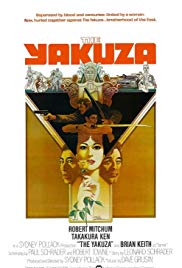
THE YAKUZA
US, 1974, 112 minutes, Colour.
Robert Mitchum, Takakura Ken, Brian Keith, Kishi Keiko, Okada Eiji, Richard Jordan.
Directed by Sydney Pollack.
Yakuza is an old Japanese word for gangster. By now American films have discovered the Orient and its martial arts and rather bloodthirsty codes of honour. Director Sidney Pollack usually makes leisurely serious dramas with some style to this action film; the result is a good-looking Japanese-gangster drama with intermittent action - at times, particularly gory, especially the final massacre. It has some ordinary thematic treatment of characters (Robert Mitchum as an ageing private eye, his Japanese former lover and her "brother") which depends towards the end - a bit late for the film to have the impact it might have had.
1. How interesting and exciting a thriller? The emphasis of the title? The explanation? The Japanese gangster codes and audience response to these? Their popularity in Japan and their standing?
2. The contribution of colour and widescreen? Japanese atmosphere and locations? The contrast between American & Japanese codes of honour and violence? The difference between the two ways of life in good, gangsterism?
3. How successful was the film as a thriller? The slow build-up for atmosphere? The sudden eruption of violence? Confusion of codes, identities, vengeance, fights?
4. How successful was the film as a Japanese thriller, portraying Japanese codes to the West? Was it a Western film with Japanese overtones?
5. The film as a gangster film? The conventions of the genre? Was it something more? The emphasis on the persons involved, cultures, World War Two and its aftermath, others ages? The significance of the final apologies and the cutting off of fingers? As symbol?
6. The impact of the violence and its purpose? Was it exploited? Necessary to communicate this world and its atmosphere? The motivation for the violence? Expected audience response to it?
7. Kilmer as hero? Robert Mitchum's style? The significance of his past, twenty years since leaving Japan, memories, his way of life in America, debts owed to friends, friendship with Tanner, with Dusty, with Wheat? Favours and help? His diplomacy, his response to violence? His disillusionment with Eiko and with Ken? Disillusionment with himself? The deaths? The re-awareness of the Japanese way of life contrasting with American? Revenge and vengeance? Change and final repentance?
8. Eiko: the Japanese woman, her past with Kilmer and Ken, the revelation of the truth, the emotive overtones of her life, her daughter and the significance of her daughter's dying? Her fidelity to Ken? Her attitude to Kilmer?
9. Ken: in World War Two, imprisonment, the past, as a gangster? His reformation and his school? The illustration of his Kendo school? His codes of behaviour, of violence? His skill in destroying enemies? Favours to Kilmer? His apology to Boro? What kind of man was he?
10. The explanation of Ken as a husband to Eiko?
11. The significance of obligations and codes, even to ways of death? The dramatic ways in which these were illustrated?
12. Tanner as the American criminal? Using Kilmer, using his daughter, using Kilmer's death? The rightness or wrongness of his being killed by Kilmer?
13. The contribution of Oliver and Dusty? Oliver and his Japanese way of life? Dusty and his fidelity to Kilmer?
14. The Japanese criminals and their presentation? Similar to American criminals?
15. How strong was the film on atmosphere, exploration of western values? Right and wrong, justice?